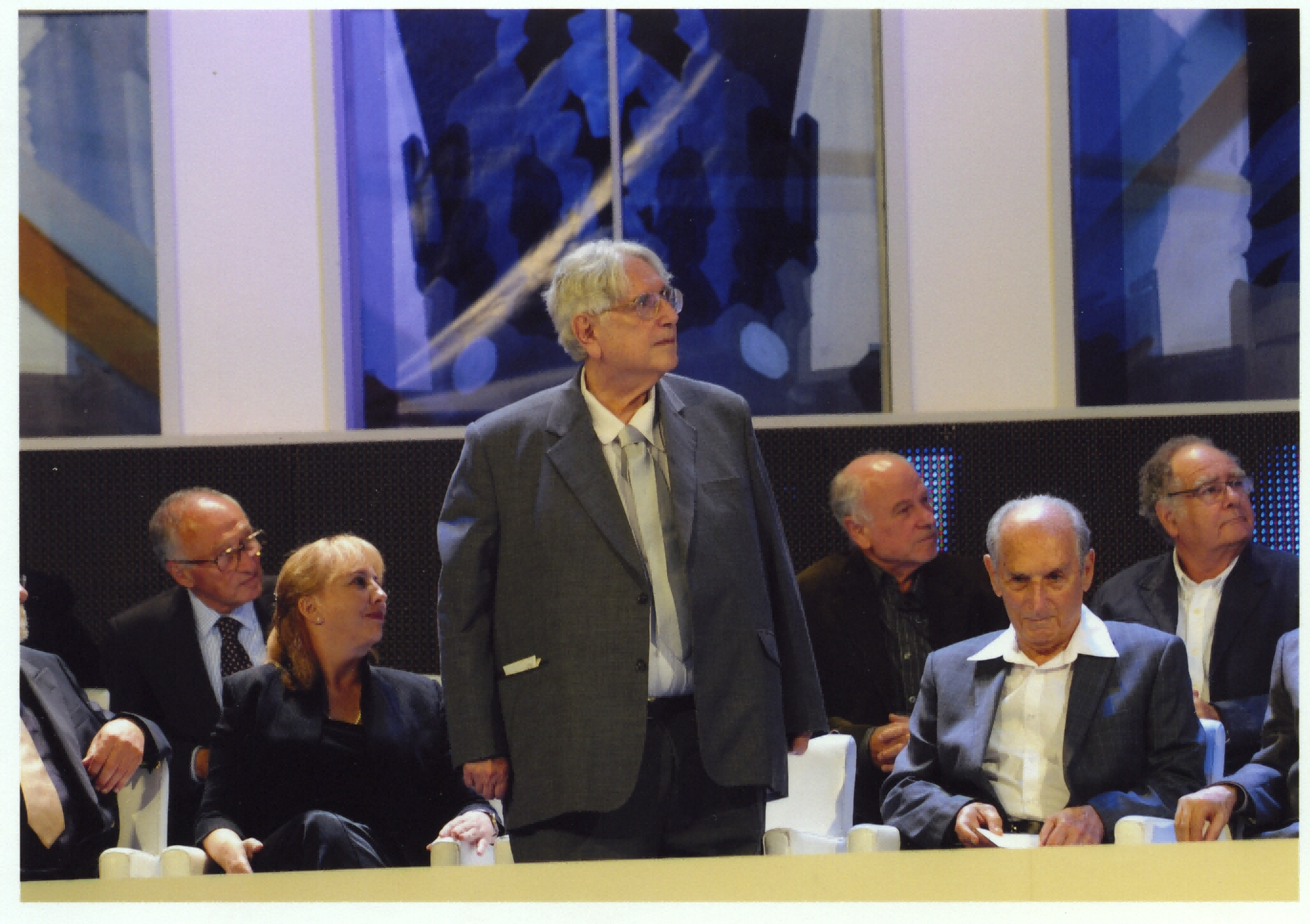


Reuven Tsur is Professor Emeritus of Hebrew Literature and Literary Theory at Tel Aviv University, served several terms as the director of the Katz Research Institute for Hebrew Literature. He has been visiting professor at the Hebrew University, at Columbia University, and at the University of Lancaster. He participated in an indefinite number of international conferences in semiotics, comparative literature, cognitive studies, literature and psychology, linguistics, and empirical aesthetics. He has been research fellow at the University of Southampton and at Yale University. He was introduced into the mysteries of speech research at the Haskins Laboratories, New Haven, and at the University of Lancaster. He is Vice President for the Middle East of the International Association for Empirical Aesthetics, and a member of the editorial board of Empirical Studies of the Arts, Psyart — a hyperlink e-journal, Cognitive Semiotics, Journal of Literary Theory. and Versification: An Electronic Journal of Literary Prosody, as well as of the advisory board of the URL Literature, Cognition & the Brain.
Reuven Tsur has developed a theory of Cognitive Poetics, and applied it to rhyme, sound symbolism, poetic rhythm, metaphor, poetry and altered states of consciousness, period style, genre, archetypal patterns, translation theory, the implied critic's decision style, and critical competence. In his books and articles he applied his theories to English, French, German, Hungarian, Italian, Spanish, and Hebrew poetry, ranging from the Bible, through the eleventh, sixteenth and seventeenth century, to the eighteenth, nineteenth and twentieth century. His Perception-Oriented Theory of Metre includes a theory of the rhythmical performance of poetry which, after 25 years of agonising search, he found a way to submit to an instrumental investigation. He has recently finished this instrumental research and published its results (see below the list of Major Publications. His book Poetic Rhythm, Structure and Performance (1998) has been published by Peter Lang). Since the publication of this book he has been applying its method to a constantly-growing corpus, exploring additional aspects of vocal performance.
In recent years there is an increasing body of references to Reuven Tsur's work that emphasize its contribution to Cognitive Poetics and the study of poetic rhythm (view a selection of references)
Reuven Tsur was awarded the Israel Prize (2009) in "General Literature", for his work in literary theory: cognitive poetics and poetic prosody.
The Prize Committee's reasons (in English translation)
Watching his own short movie at the ceremony:
View a short movie (in Hebrew) prepared for the Israel Prize ceremony:
Shaking hands with President Shim'on Peres; Prime Minister Benjamin Netanyahu; and Knesset Speaker Rubi Rivlin:


He teaches courses in cognitive poetics; the phonetics of poetic language and its relationship to meaning; interpretation; basic issues in poetic theory; a cognitive approach to religious and mystic poetry; the grotesque; romantic and anti-romantic elements in Modern Hebrew Poetry; a perspectivistic approach to Mediaeval Hebrew Poetry; literature of extreme situations; metaphor; critical competence and the critic's decision style; poetic drama; elements of drama.
In 1996-97 he taught the courses: The Phonetics of Poetic Language and its Relationship to Meaning; The Grotesque in Literature and in the Visual Arts (with Prof. Nurith Kna'an-Kedar); Basic Issues in Poetic Theory.
In 1997-98 he taught the courses: What is Interpretation?; A Perspectivistic Approach to Mediaeval Hebrew Poetry; Basic Issues in Poetic Theory.
In 1998-99 he teaches the courses: The Phonetics of Poetic Language and its Relationship to Meaning; Cognitive Poetics—Basic Issues; A Perspectivistic Approach to Mediaeval Hebrew Poetry; Basic Issues in Poetic Theory.
Major publications (books and major articles):
Books Published
Reuven Tsur (1964) Studies in the Poetry of Bialik (in Hebrew). Tel Aviv: Daga. 102 pp.
Reuven Tsur (1969) Studies in Mediaeval Hebrew Poetry (in Hebrew) Tel Aviv: Daga. 222 pp.
Reuven Tsur (1975) Convention and Rhetoric in Mediaeval Hebrew Poetry (in Hebrew). Tel Aviv: Daga. 88 pp.
Reuven Tsur (1977) A Perception-Oriented Theory of Metre (in English). Tel Aviv: The Porter Institute for Poetics and Semiotics. 244 pp.
Reuven Tsur (1983) Meaning and Emotion in Poetry (in Hebrew). Tel Aviv: The Katz Research Institute for Hebrew Literature. 232 pp.
Reuven Tsur (1985) Romantic and Anti-Romantic Elements in Poems by Bialik, Tchernichowsky, Shlonsky and Amikhay (in Hebrew). Tel Aviv: Papyrus. 173 pp.
Reuven Tsur (1987) The Road to "Kubla Khan": A Cognitive Approach. (in English). Jerusalem: Israel Science Publishers. 95 pp.+XIV.
Reuven Tsur (1987) How Do the Sound Patterns Know they are Expressive: The Poetic Mode of Speech-Perception (in English). Jerusalem: Israel Science Publishers. 154 pp.
Reuven Tsur (1987) Mediaeval Hebrew Poetry in a Double Perspective: The Versatile Reader and Hebrew Poetry in Spain (in Hebrew). Tel Aviv: University Publishing Projects. 221 pp.
Reuven Tsur (1987) On Metaphoring (in English). Jerusalem: Israel Science Publishers. 315 pp. +X.
Reuven Tsur (1988) Hebrew Hypnotic Poetry—Preliminary Observations. (in Hebrew). Tel Aviv: The Katz Research Institute for Hebrew Literature. 88 pp.
Reuven Tsur (1992)What Makes Sound Patterns Expressive: The Poetic Mode of Speech-Perception (in English). Durham N, C.: Duke UP. 174 pp.
(2004) Japanese translation by Shigeko Uchida, published by Otori Shobo. [click here to view the Japanese jacket]
Reuven Tsur (1992) Toward a Theory of Cognitive Poetics (in English). Amsterdam: Elsevier (North Holland) Science Publishers. 580 pp.
Reuven Tsur (1996) Text, Reader, World—The Implied Critic's and the Real Reader's Decision Style (in Hebrew). Tel Aviv: Hakibuts Hameukhad Publishing House. 327 pp.
Reuven Tsur (1998) Poetic Rhythm: Structure and Performance—An Empirical Study in Cognitive Poetics (in English). Bern: Peter Lang. 378 pp.
Reuven Tsur (2000) Between Cognitive and Historical Poetics (in Hebrew). Tel Aviv: Hakibuts Hameukhad Publishing House. 220pp.Reuven Tsur (2003) On The Shore of Nothingness: Space, Rhythm, and Semantic Structure in Religious Poetry and its Mystic-Secular Counterpart—A Study in Cognitive Poetics. Exeter: Imprint Academic. 380 pp
Reuven Tsur (2006) "Kubla Khan"—Poetic Structure, Hypnotic Quality and Cognitive Style: A Study in Mental, Vocal, and Critical Performance. Amsterdam: John Benjamins.Tsur, Reuven (2012) Playing by Ear and the Tip of the Tongue: Precategorial information in poetry. Amsterdam / Philadelphia: John Benjamins.
Tsur, Reuven (2013) Emotional Disorientation—The Grotesque and Related Qualities (in Hebrew). Ramat Gan: Bar Ilan University Press.
Tsur, Reuven (2017) Poetic Conventions as Cognitive Fossils Oxford: Oxford UP.
Major Articles
Reuven Tsur (1972) "Articulateness and Requiredness in Iambic Verse" (in English). Style 6: 123-148.
Reuven Tsur (1974) "Poem, Prayer and Meditation: An Exercise in Literary Semantics" (in English). Style 8: 405-425.
Reuven Tsur (1975) "Two Critical Attitudes: Quest for Certitude and Negative Capability" (in English). College English 36: 776-788.
Reuven Tsur (1977) "More about the Translations and Original Poetry of Lea Goldberg" (in Hebrew). Hassifrut 24: 117-133.
Reuven Tsur (1978) "Emotions, Emotional Qualities and Poetry" (in English). Psychocultural Review 2: 165-180.
Reuven Tsur (1979) "Levels of Information Processing in Reading Poetry" (in English). Critical Inquiry 5: 751-759.
Reuven Tsur (1983) "Linguistic Intuition as a Constraint upon Interpretation: An Exercise in Cognitive Poetics" (in Hebrew), in Dan Miron (ed.), Jerusalem Studies in Hebrew Literature 2: 21-53.
Reuven Tsur (1988) "'Oceanic' Dedifferentiation and Poetic Metaphor" (in English) Journal of Pragmatics 12: 711-724.
Reuven Tsur(1989) "Horror Jokes, Black Humor and Cognitive Poetics". Humor 2-3: 243-255.
Reuven Tsur (1991) "Ady's Magic". Holmi 3: 585-594. (in Hungarian).
Glicksohn, J., R. Tsur and Ch. Gootblatt (1991) "Absorption and Trans-Inducing Poetry" (in English). Empirical Studies of the Arts 9/2: 115-122.
Tsur, R., Glicksohn, J., & Goodblatt, C. (1991) "Gestalt Qualities in Poetry and the Reader's Absorption Style" (in English). Journal of Pragmatics 16/4: 193-206.
Reuven Tsur (1993) "The Flute, the Piglet, and the Cuckoo—The Translated Poem as an Aethetic Object" (in Hungarian). Holmi 5: 515-528.
Reuven Tsur (1994) "Droodles and Cognitive Poetics—Contribution to an Aesthetics of Disorientation". Humor 7 55-70.
Reuven Tsur (1994) "(Hungarian) Hypnotic Poetry". Holmi 6: 243-265. (in Hungarian).
Reuven Tsur (1996) "Rhyme and Cognitive Poetics" (in English). Poetics Today 17: 55-87.
Reuven Tsur and Yehosheva Bentov (1996) "The Rhythmic and Strophic Organization of Mediaeval Hebrew Poetry (A Cognitive Approach)" (in English). Empirical Studies of the Arts 14: 183-206.
Reuven Tsur (1997) "Poetic Rhythm: Performance Patterns and Their Acoustic Correlates". (in English)
Versification: An Electronic Journal Devoted to Poetic Prosody 1:1
Reuven Tsur (1997) "Picture Poems: Some Cognitive and Aesthetic Principles" Psyart —A Hyperlink Journal for the Psychological Study of the Arts.
http://www.psyartjournal.com/article/show/tsur-picture_poems_some_cognitive_and_aesthet
Reuven Tsur (1997) "Douglas Hodge Reading Keats's Elgin Marbles Sonnet". Style 31: 34-57. (in English)
Reuven Tsur (1997) "Sound Affects of Poetry—Critical Impressionism, Reductionism, and Cognitive Poetics" Pragmatics and Cognition 5: 283-304. (in English)
Reuven Tsur (1997) "To Be Or Not To Be—That is the Rhythm: A Cognitive-Empirical Study of Poetry in the Theatre". Assaph—Studies in Theatre 13: 95-122 (in English).
Reuven Tsur (1998) "Light, Fire, Prison: A Cognitive Analysis of Religious Imagery in Poetry." http://www.psyartjournal.com/article/show/tsur-light_fire_prison_a_cognitive_analysis_o
Reuven Tsur (1999) "Ibn Khalphun's 'When Desire Awakens Me'—On Relativism, Absolutism and Perspectivism in the Study of Mediaeval Hebrew Poetry". Jewish Studies Quarterly 6: 113-139 (in English).
Reuven Tsur (2000) "Lakoff's Roads not Taken". Pragmatics and Cognition 7: 339-359 (in English).
Reuven Tsur (2000) "Metaphor and Figure-Ground Relationship: Comparisons from Poetry, Music, and the Visual Arts". PSYART: A Hyperlink Journal for the Psychological Study of the Arts, article 000201. Available HTTP:
http://www.psyartjournal.com/article/show/tsur-metaphor_and_figure_ground_relationship_
Reuven Tsur (2000) "The Performance of Enjambments, Perceived Effects, and Experimental Manipulations" PSYART: A Hyperlink Journal for the Psychological Study of the Arts. Available HTTP: http://www.psyartjournal.com/article/show/tsur-the_performance_of_enjambments_perceived
Reuven Tsur (2000) "Picture Poetry, Mannerism, and Sign Relationships". Poetics Today 24: 751–781 (in English).
Reuven Tsur (2001) "The Death-and-Rebirth Archetype in Poetry—An Homage to Maud Bodkin" Proceedings of the 16th International Conference on Literature and Psychoanalysis. 221-228. Available online: http://www.tau.ac.il/~tsurxx/Recueillement.html
Reuven Tsur (2001) "Translation Studies, Cultural Context, and Dante". CLCWEB—Comparative Literature and Culture: A WWWebJournal. Available Online: http://docs.lib.purdue.edu/clcweb/vol3/iss1/1/
Reuven Tsur (2001c) "Onomatopoeia: Cuckoo-Language and Tick-Tocking—The Constraints of Semiotic Systems". Iconicity In Language.
Reuven Tsur (2002) "Some Cognitive Foundations of 'Cultural Programs'". Poetics Today 23.1: 63–89.
Reuven Tsur (2002) "A Perception-Oriented theory of Metre and the rhytmical Performance of Poetry". Plenary Lecture, in Christoph Küper (ed.), Meter, Rhythm and Performance: proceedings of the international conference on meter, rhythm and performance (held in May 1999 in Vechta). Frankfurt am Main: Peter Lang. 19-38.
Reuven Tsur (2002) "Some Comments on the Lakoffean Conception of Spatial Metaphor". In Thomasz Komendzinski (ed.), Metaphor: A Multidisciplinary Approach. Special issue of Theoria et Historia Scientiarum VI. No. 1. 245-267.
Reuven Tsur and Motti Benari (2002) "'Composition of Place', Experiential Set, and the Meditative Poem (A Cognitive-Pragmatic Approach)". Pragmatics and Cognition. 203-237.
Reuven Tsur (2002) "Phonetic Cues and Dramatic Function—Artistic Recitation of Metered Speech". (Expanded version). PSYART: A Hyperlink Journal for the Psychological Study of the Arts.
http://www.psyartjournal.com/article/show/tsur-phonetic_cues_and_dramatic_function_arti
Reuven Tsur (2002) "Aspects of Cognitive Poetics", in Elena Semino and Jonathan Culpeper (eds.), Cognitive Stylistics—Language and Cognition in Text Analysis. John Benjamins Publishing Company: Amsterdam/Philadelphia.
Reuven Tsur and Idith Eynath-Nov (2003) "Artistic Devices and Mystic Qualities in Hebrew Devotional Poems". Tova Rozen and Avner Holtzman eds., Essays in Honor of Yona David. 93–117 (in Hebrew).
Reuven Tsur (2003) "Deixis and Abstractions: Adventures in Space and Time" in Joanna Gavins and Gerard Steen (eds.), Cognitive Poetics in Practice. London: Routledge. 41–54.
Reuven Tsur (2003) "The Demonic and the Grotesque" in E. Mark Stern and Robert B. Marchesani (eds.) Inhabitants of the Unconscious: The Grotesque and the Vulgar in Everyday Life (The Psychotherapy Patient, Volume 12, Numbers 1/2) 111-126. Binghamton, NY: The Haworth Press.
Reuven Tsur (2004) "Some Mannerist Ingenuities in Mystic Poetry". Journal of Consciousness Studies (controversies in science & the humanities) Vol. 11 No. 5-6. SPECIAL FEATURE ON 'CONSCIOUSNESS AND LITERATURE' Edited by Roberta Tucker. 60-78.
Tsur, Reuven (2006 Winter) "Delivery style and listener response in the rhythmical performance of Shakespeare's sonnets". College Literature 33.1 (special issue on "Cognitive Shakespeare: Criticism and Theory in the Age of Neuroscience", guest-edited by Patrick Colm Hogan and Lalita Pandit) pp. 170-196.
Tsur, Reuven (2006) "Size-Sound Symbolism Revisited" Journal of Pragmatics 38 pp. 905-924
Tsur, Reuven (2006) "Constraints of the Semiotic System—Onomatopoeia, Expressive Sound Patterns and Poetry Translation", in Uta Klein, Katja Mellmann, Steffanie Metzger (Hrsg.) Heuristiken der Literaturwissenschaft—Disziplinexterne Perspektiven auf Literatur. Paderborn: mentis. 246–270.
Tsur, Reuven (2006) "Archetypen, Szenerie und Metaphorik in Goethes Faust I—Ein kognitiver Ansatz". DER DeutschUNTERRICHT, Ralph Müller & Evelyn Ziegler (Hrsg.) Metapher: 61–69.
Tsur, Reuven (2007) "Cognitive Poetics and Poetry Recital", in Colin Martindale, Paul Locher, and Vladimir M. Petrov eds., Evolutionary and Neurocognitive Approaches to Aesthetics, Creativity and the Arts. Amityville N.Y.: Baywood Publishing Company. 65–87.
Tsur, Reuven (2007) "Not All is Vanity: Yossi Banay Reading Alterman" in Hannan Hever (ed.) A MOMENT OF BIRTH—Studies in Hebrew and Yiddish Literatures in Honor of Dan Miron. Jerusalem: Bialik Institute. 849–873 (in Hebrew).
Tsur, Reuven (2007) "Mihály Babits: 'Evening Question'—Secrets of the Mysterious Craft". Literatura 32.4: 507–524 (in Hungarian).
Tsur, Reuven (2007) "The Mouse, the Werwolf, and the Inflection of Nouns—Wit and Emotional Disorientation". Literatura: 387–398 (in Hungarian).
Tsur, Reuven (2008) "Two Medieval Hebrew Devotional Poems—Convention, Evaluation, and 'Platonic' vs 'Metaphysical' Poetry", in William Baker and Michael Lister (eds.), David Daiches—A Celebration of his Life and Work. Sussex Academic Press: Brighton and Portland. 180–187.
Tsur, Reuven (2008) "Two Medieval Hebrew Devotional Poems—Convention, Evaluation, and 'Platonic' vs 'Metaphysical' Poetry". Style 41: 434–441.
Tsur, Reuven (2008) "Deixis in Literature—What Isn't Cognitive Poetics?" Pragmatics & Cognition 16:1,123-154.
Tsur, Reuven (2008) "Comparing Approaches to Versification Style in Cyrano de Bergerac". Cognitive Semiotics: 146-168
Tsur, Reuven (2008) "Poetic Conventions as Fossilized Cognitive Devices; The Case of Mediaeval and Renaissance Poetics". PSYART: A Hyperlink Journal for the Psychological Study of the Arts.
http://www.psyartjournal.com/article/show/tsur-poetic_conventions_as_fossilized_cogniti
Tsur, Reuven (2009) "Defamiliarization revisited", in Bruce Fraser and Ken Turner (eds.) Language in Life, and a Life in Language: Jacob Mey—A Festschrift. Emerald: United Kingdom. 399-404.
Tsur, Reuven (2009) "Metaphor and figure-ground relationship: comparisons from poetry, music, and the visual arts", in Geert Brône and Jeroen Vandaele (eds.), Cognitive Poetics: Goals, Gains and Gaps. Berlin and New York: Mouton de Gruyter. 237-277.
Tsur, Reuven (2009) The Place of Nonconceptual Information in University Education with Special Reference to Teaching Literature. Pragmatics & Cognition 17: 309–330.
Tsur, Reuven (2007) The Structure and Delivery Style of Milton's Verse: An Electronic Exercise in Vocal Performance. ESC: English Studies in Canada 33: 149–168. (appeared in 2009).
Tsur, Reuven (2009) Mihály Babits: 'Evening Question'—Poetry and Recital, in Balázs Fűzfa (ed.), Evening Question. Szombathely: Savaria University Press. 288-324 (in Hungarian).
Tsur, Reuven (2010) "Infantile Regression, Violating Taboos and the Grotesque". Problems of Literary Genres LIII: 9–30.
Tsur, Reuven (2010) "Linguistic Devices and Ecstatic Poetry: 'The Windhover'—Tongue–Twisters and Cognitive Poetics".Journal of Literary Theory 4: 121–139.
Tsur, Reuven (2010) "The Poetic Function and Aesthetic Qualities: Cognitive Poetics and the Jakobsonian Model". Acta Linguistica Hafniensia 42: 2–19.
Tsur, Reuven (2011) "Some Remarks on the Nature of Trochees and Iambs and their Relationship to Other Metres". Psyart—a hyperlink e–-journal. Available online: http://www.psyartjournal.com/article/show/tsur-some_remarks_on_the_nature_of_trochees_a
Tsur, Reuven (2010) Poetic Conventions as Cognitive Fossils. Style: 44 No. 4: 496–523.
Tsur, Reuven (2011) "Metricalness and Rhythmicalness—What Our Ear Tells Our Mind", in Mihhail Lotman and Maria–Kristina Lotman (eds) Frontiers in Comparative Prosody. Bern: Peter Lang. 57–79.
Tsur, Reuven (2011) "The rhythmical Performance of Milton's 'On his Blindness'—Problems and Solutions" in Barry P. Scherr, James Bailey and Evgeny V. Kazaertsev (eds.) Formal Methods in Poetics—ACollection of Scholarly works to the Memory of Professor M.A. Krasnoperova. Lüdensheid: RAM Medienverlag. 202–233.
Tsur, Reuven (2012) "Poetic Structures and Poetic Qualities", in Peter F. Bundgaard, Henrik Skov Nielsen and Frederik Stjernfelt (eds.) Narrative Theories and Poetics—5 Questions. Automatic Press. 245–255.
Tsur, Reuven (2011) "Aesthetic Qualities as Structural Resemblance: Divergence and Perceptual Forces in Poetry", in Michelucci, Pascal, Olga Fischer and Christina Ljungberg (eds.), Semblance and Signification. Amsterdam/Philadelphia: John Benjamins. 233–250
Reuven Tsur (2012) "The Neurological Fallacy". Pragmatics & Cognition: 420–446.
Reuven Tsur (2012) "Az Eszmélet költői szerkezete", in Fűzfa Balázs (ed.) Eszmélet (A legszebb magyar vers 11). Szombathely (Hungary): Savaria UP. 304–314.
Reuven Tsur (2012) "Az Eszméet Héber forditása", in Fűzfa Balázs (ed.) Eszmélet (A legszebb magyar vers 11). Szombathely (Hungary): Savaria UP. 366â–378.Â
Reuven Tsur (2013) "Masculine and Feminine Rhymes: Their Structural Effect" Style 47.1: 1–24.
Reuven Tsur (2013) "Where Do Conventions Come From? Constraints or Plasticity. Follow-up Note" Style 47.3: 275–282.Â
Reuven Tsur (2015) Free Verse, Enjambment, Irony: A Case Study. Style: 49: 35–46.
Gafni, Chen and Reuven Tsur (2015) "Softened" voice quality in poetry reading and listener response. Scientific Study of Literature 5.1: 49–83.
Reuven Tsur (2016) Landscape Descriptions and Emotional Qualities—Cognitive and Neurological Correlates. Psyart—A Hyperlink Journal for the Psychological Study of the Arts. (in English). Available HTTP: http://www.clas.ufl.edu/ipsa/journal.Reuven Tsur (2017) Metre, rhythm and emotion in poetry — A cognitive Approach. Studia Metrica et Poetica 4–40.
Gafni, Chen and Reuven Tsur (2017) "Softened" Voice Quality in Poetry Reading: An Acoustic Study. Style 51: 456–481.
Tsur, Reuven and Chen Gafni (2018) Enjambment — Irony, Wit, Emotion. A Case Study Suggesting Wider Principles. Studia Metrica et Poetica 5.2: 7–28. https://doi.org/10.12697/smp.2018.5.2.01
Tsur, Reuven (2018) The Numinous as Aesthetic Quality. Style, Vol. 52, No. 4: 361–384.
Reuven Tsur (2018) Elusive Qualities in Poetry, Receptivity, and Neural Correlates. in Szilvia Cs‡bi (ed.) Expressive Minds and Artistic Creations. Oxford: Oxford UP. 279–302.
Tsur, Reuven and Chen Gafni (2019) Phonetic Symbolism: Double-Edgedness and Aspect-Switching. Literary Universals. https://literary-universals.uconn.edu/2019/07/20/phonetic-symbolism-double-edgedness-and-aspect-switching/
Tsur, Reuven (forthcoming) Performing Mediaeval Hebrew Poetry. Studia Metrica et Poetica.
Tsur, Reuven (forthcoming) Statistical vs Structural-Cognitive Approaches to Phonetic Symbolism —Two Case Studies. Style.
Gafni, Chen and Reuven Tsur (forthcoming) Some Experimental Evidence for Sound-Emotion Interaction. Scientific Study of Literature.
Tsur, Reuven and Chen Gafni (forthcoming) Methodological Issues in the Study of Phonetic Symbolism. Scientific Study of Literature.
